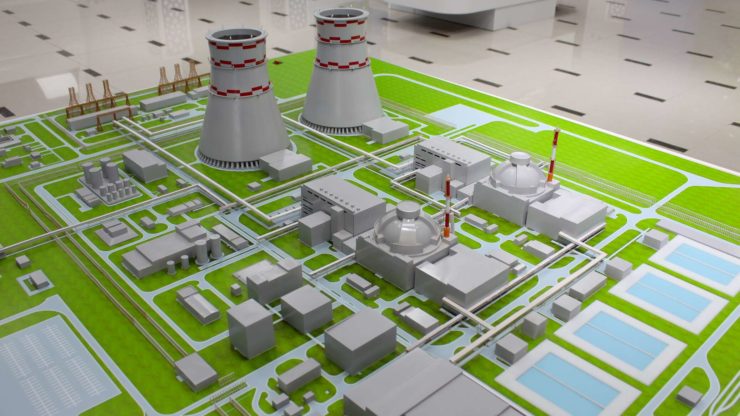
Rosatom’s most active development in Central Asia to date has been the creation of the first energy facility of its kind in Uzbekistan – the Jizzakh NPP. In September 2018, Russia and Uzbekistan signed an intergovernmental agreement on the construction of a nuclear power plant. In September 2023, the Joint Commission at the level of the heads of government of Russia and Uzbekistan discussed issues related to the construction of the NPP. Survey work commenced at a promising construction site near Lake Tuzkan around the same time.
On November 28, 2023, Alexey Likhachev, Director General of ROSATOM, announced at the Primakov Readings that the parties had reached the final stage of agreeing on a contract to build a nuclear power plant. A few days before this statement, the Uzbek Minister of Energy reported that they were following procedures based on IAEA requirements, site licensing, and active development of regulatory documents. Additionally, in the minister’s interview, it was stated that Uzbekistan is interested in establishing a small-capacity nuclear power plant in the country, including within the framework of cooperation with Rosatom. This decision may have been made in an effort to optimize the project’s cost, which the Uzbek side intends to undertake. During talks between the presidents of the two countries in October 2023, the proposal to construct small nuclear power plants was also discussed.
The interview also shed light on the plans of Rosatom and the Uzbek Ministry of Energy to use in a future project the cooling system currently being implemented in Hungary – at the Paks NPP, which is being built with the direct participation of Rosatom. The new technology aims to decrease the amount of water utilized in cooling reactors, which is particularly important in Uzbekistan due to water scarcity.
The project entails constructing a nuclear power plant with two power units, with the potential to build two more units. The project’s cost is $11 billion, and the first power unit is scheduled to be commissioned in 2028. The power plant’s capacity will reach 2,400 MW. It is assumed that the facility will be constructed using the funds that Russia will provide to the republic as a soft loan.
It is important to note that the project has not been open for public discussion, unlike in Kazakhstan where a referendum on the construction of a nuclear power plant is currently being prepared. However, there is a significant amount of public discussion surrounding the Rosatom project in Uzbekistan. Representatives of political and public circles in Uzbekistan have expressed concern about the safety of the prospective NPP project. Specifically, they question Rosatom’s ability to ensure safe operation of the facility in the republic’s specific conditions, given its location in a zone of increased seismic activity. During the project discussions, negotiators rightfully referred to the tragic 1966 Tashkent earthquake that destroyed a significant portion of the city. However, Rosatom’s response to this urgent and sensitive question convinced their Uzbek colleagues. They chose the VVER-1200 type reactors, which are considered the safest in the world, for the first NPP in the republic.
While Soviet (and later Russian) reactor technology can be criticized for the events that occurred in Chernobyl in April 1986, it is important to acknowledge that the USSR (and later the Russian Federation, which inherited its expertise) has accumulated a tremendous amount of research material obtained during the investigation of the causes of the disaster. The analysis results were directly considered in the development of VVER-1200. Although this reactor model is new, it has already been successfully tested at Leningrad and Novovoronezh NPPs.
The development of nuclear power in Central Asia could help alleviate the issue of water scarcity in the region. Kazakhstan, Uzbekistan, and Turkmenistan face acute shortages of water resources, while Tajikistan and Kyrgyzstan control most of them. Unlike hydropower, nuclear power does not require significant water resources for power generation. The latest nuclear power plant reactor cooling technologies, currently being implemented by Russia and Hungary at the Paks NPP under construction, allow for further optimization of water consumption for cooling needs. This is already many times less than that of hydroelectric power plants. If successfully implemented in Uzbekistan and Kazakhstan, these technologies could be ‘naturalized’ to the region.
Uzbekistan is particularly interested in nuclear power due to its plans to increase natural gas exports, a significant portion of which is currently utilized for power generation. In addition, it is planned to use the saved natural gas in the actively developing petrochemical industry: the new NPP will allow to save up to 3.5 billion cubic meters of this valuable resource for these needs. The decision to favor nuclear power plants is also supported by the rapid development of alternative power generation in the country. By 2030, alternative power generation is expected to account for 25% of the country’s energy balance. The main issue is the unstable power generation, which can be compensated for by stable power generation at nuclear power plants (NPPs).
Boris Kushkhov, Department of Korea and Mongolia, Institute of Oriental Studies of the Russian Academy of Sciences, exclusively for the online magazine “New Eastern Outlook”.
